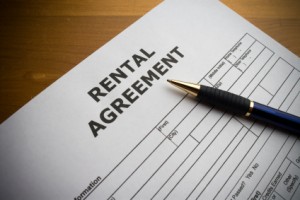Posted by Teresa on August 31, 2012 under Lease and Rental Agreements, Rents and Deposits, Tenant Credit Checks | 
 How do you say “no” to tenants who don’t meet your lease qualifications? Some landlords have a hard time doing so, especially when the applicants are persistent. Here are a few examples:
How do you say “no” to tenants who don’t meet your lease qualifications? Some landlords have a hard time doing so, especially when the applicants are persistent. Here are a few examples:
- Don denied an applicant based on weak credit. The applicant offered a bigger security deposit. Now Don is thinking of approving his application.
- Karen is a landlord in a similar situation. Her non-qualifying applicants offered to pay an entire year’s rent up front. Karen decided to accept the deal and signed the lease.
- Another landlord reports that a non-qualified couple is pleading with her to rent to them, saying they have not found another rental that meets their needs. The woman has good credit; the man has terrible credit. The landlord is thinking of putting only the woman’s name on the lease, with a substantial cash security deposit.
What is wrong with each of these decisions?
- In the first example, Don is allowing a larger security deposit to cloud his judgment. First, he lives in Massachusetts, where landlords are limited to charging no more than one month’s rent for a security deposit. Next, he is bending his own rules, which is a slippery slope. If a tenant knows he’ll cave on one aspect of the tenancy, they may be likely to push other rules, as well. Is the rent really due on the 1st? Wouldn’t it be okay to move some extra family members into the rental unit? Finally, treating every applicant equally is important to avoid charges of discrimination. Let’s say the next applicant also had bad credit and Don refused to sign a lease with them. They might charge that Don showed preferential treatment to the first tenant and that they are being discriminated against, due to their race, religion, family status, gender, age, etc.
- In Karen’s case, one might think that paying a year’s rent up front would erase any worries about the tenant’s financial situation. However, most strong tenants don’t offer prepaid rent—especially a year’s worth—because they can’t afford it. Karen should ask herself why an applicant with bad credit has that much cash laying around. Have they been scamming other landlords and living rent-free? Have they been evicted? Or are they involved in an illegal cash enterprise? The offer of a year’s worth of rent up front should be a red flag.
- In the third example, this landlord is asking for trouble. All adult residents should be put on the lease and held liable for the terms of the lease. What guarantee does the landlord have that the female will always be responsible for the rent? What if the couple breaks up and she moves out? The landlord will have a resident living in the rental unit without a lease.
Experienced landlords know that sticking to your standards and leasing only to solid tenants who meet your criteria are important steps in building a successful rental business. If denied applicants don’t hear your “no,” just say it again. And louder. And then, hold out for well-qualified tenants. Tenant screening on every applicant, with minimum qualifying credit scores, is a landlord’s best practice.
Posted by Teresa on August 24, 2012 under Landlord Tips, Lease and Rental Agreements, Tenant Screening & Background Checks | 
 Most experienced landlords will tell you that tenant screening is the most important aspect of renting property. Failing to screen prospective tenants causes more problems than just about anything else. After all, each tenant is a potential liability to a landlord.
Most experienced landlords will tell you that tenant screening is the most important aspect of renting property. Failing to screen prospective tenants causes more problems than just about anything else. After all, each tenant is a potential liability to a landlord.
Thoroughly checking up on tenants’ identification, credit history, criminal background, work history and previous rental situations can give you a clear picture of the tenant you are about to trust to live with your property and among your other tenants.
Here are some basic tenant screening tips from real landlords:
- Don’t skip the tenant screening process, no matter how nice or trustworthy a prospective tenant seems.
- Treating each applicant equally will help you stay within the law. This is another good reason to screen every tenant.
- Look at credit history, criminal history, evictions, judgments, bankruptcies and sex offender status.
- Fake IDs are easy to buy or make, so check the applicant’s Social Security Number and identity to be sure they are who they say they are.
- If the applicant is local, drive by their current address to see how they live. Is there a beater car parked in the yard? Garbage strewn about? Or is it neat and clean? How it looks is a good indicator of how they will treat your property.
- Don’t judge a prospective tenant by his or her clothing, car or jewelry. A hard working, honest tenant could be dressed in dirty work clothes, while a flashy car and fancy watch could indicate someone who has plenty of money, or is simply living above his or her means.
- Beware of tenants who want to move in fast and have plenty of cash to cover rent and the security deposit. Take your time and conduct your screening process.
- Talk to previous landlords. If a tenant specifically asks you not to contact the current landlord, find out why, and talk to former landlords. Conduct the rest of your screening process and if the tenant is approved, let him or her know, and then contact the current landlord.
- Don’t base your entire approval on the landlord’s reference. Some will be anxious to get rid of a bad tenant (and give a good reference). Others will be honest.
- Take notice if the prospective tenant is late for appointments without apology or is unhappy about paying an application or screening fee.
- Ask why they’re moving.
Using these tips, along with a professional tenant screening service, can help insure that you lease only to qualified tenants. Good luck!
Posted by Teresa on August 21, 2012 under Landlord Tips, Lease and Rental Agreements | 
 Across the country, college students are gearing up for a new school year. That means securing housing, and for many of these kids, campus housing is not an option. Whether their school is short on housing, their parents are looking for ways to save from ever-rising room and board fees or they simply prefer to live off campus, they’ll choose renting a house or an apartment.
Across the country, college students are gearing up for a new school year. That means securing housing, and for many of these kids, campus housing is not an option. Whether their school is short on housing, their parents are looking for ways to save from ever-rising room and board fees or they simply prefer to live off campus, they’ll choose renting a house or an apartment.
For landlords, student tenants can be lucrative. Many college towns have limited housing available, so vacancy is rarely a problem, and getting market rent—or above—is not unusual. In addition, mom and dad are often paying the rent, so that’s not a problem, either.
On the other hand, student tenants don’t always work out. Some are on their own for the first time and don’t yet realize the impact their actions have on others. Others don’t have mom and dad to back them up, so paying rent on time could be a problem. Students can be noisy, messy, and disrespectful of you, your property and the neighbors. They may not understand the terms of the lease or think that certain rules actually apply to them.
In other words, student tenants are just like the rest of the population. Some are good, some are not so good. So is it worth the hassle to rent to students? Many landlords say “yes!” Renting to students can be a sound business decision when approached from a business standpoint, with firm management, enforcement of the terms of the lease, as well as your rules and regulations.
Ten Tips For Renting to Students
- Never rent without a lease. Go into more detail than you think you need, and review it with your prospective tenants.
- When setting rents and security deposits, take into consideration the potential for higher repair and maintenance costs.
- Get each student tenant’s parent to co-sign the lease, making them responsible for late rent, damages, etc.
- Reinforce to student tenants that unauthorized guests or roommates are not allowed. Each occupant must be on the lease.
- Screen each potential tenant. Even though the students may be young, they could have criminal histories or be a poor credit risk. Tenant screening is a must.
- Determine whether your lease will run for 12 months or for the school year, which could be fewer then 12.
- Be sure the lease states that all tenants are responsible for the entire rent. If one student moves out, his or her share is still due and payable by the remaining tenants.
- Offer online rent payment for the convenience of your tenants and fewer hassles for you.
- Contact the parents or co-signers at the first sign of trouble, whether it’s property damage, noise problems or late rent.
- Enforce your rules. When students know what to expect from you, as well as the consequences of their actions, they are more likely to behave.
Posted by Teresa on July 17, 2012 under Fair Housing Act, Landlord and Tenant FAQs, Tenant Screening & Background Checks | 
 No matter if you’re a long-time landlord or new to the business, you’ll likely encounter a wide mix of tenants. Some will be easier to deal with than others. They pay their rent on time, follow your rules and cause no problems. Other tenants can only be described as problem tenants. Most landlords would probably agree that if they could turn back the clock, they would not have agreed to lease to these tenants in the first place.
No matter if you’re a long-time landlord or new to the business, you’ll likely encounter a wide mix of tenants. Some will be easier to deal with than others. They pay their rent on time, follow your rules and cause no problems. Other tenants can only be described as problem tenants. Most landlords would probably agree that if they could turn back the clock, they would not have agreed to lease to these tenants in the first place.
Trouble is, you can’t always know if a tenant will be a problem. Experienced landlords know that even those with good jobs, good credit scores and sparkling references can later turn out to be duds—or worse. But there are warning signs that every landlord should know.
Five Warning Signs of Problem Tenants
- They gripe about the application fee. Good tenants realize that running background checks and tenant credit checks, calling references and processing paperwork take time and money. They pay the application fee without complaint. A lease applicant who can’t pay the fee, or complains about it, is a red flag.
- They ask for more time to pay the first month’s rent and security deposit. Sure, it can be tough to come up with that much money at once. But remember, you’re running a business, not a charity. If a tenant cannot pay all of the rent and security deposit up front, you may want to pass on him or her and wait for someone who can. It’s a matter of choice. Let another landlord deal with it.
- They are new at their job. This isn’t always a bad thing. Plenty of people switch jobs because they’re offered better positions that pay more, and they can afford more rent. But if a prospective tenant has had several jobs in the past two or three years, the new job might not last for long. And soon, the excuses for paying rent late will begin.
- They mention relationship problems. Keep in mind that according to the Fair Housing Act, landlords may not discriminate against applicants based on marital status. It’s illegal to refuse to rent to a divorced person, a single person or a married person because of their status alone. But if an applicant mentions boyfriend or girlfriend problems, or that he or she is trying to get away from someone, consider these red flags. Trouble typically follows people around. If you don’t want an upset estranged husband or troubled ex-girlfriend on your hands, pass on this tenant.
- They ask too many questions. There’s a fine line between having a healthy interest in your rental property and showing warning signs of being a problem tenant. Be on alert if a prospective tenant asks about things like:
- The racial makeup of your building or the neighborhood.
- Exactly what the electric, sewer or gas bills will be.
- How to file complaints or repair requests.
- Where they can smoke (if you have a non-smoking property).
- How often you’ll be inspecting the property, and how much warning you’ll be giving.
- The type of questions, the number of them, or the way they are asked can tell you a great deal about the person who’s applying to live in your property.
As a landlord, you get to decide with whom you enter into a lease agreement. Keep your eyes and ears open, trust your gut instinct and always verify everything a prospective tenant tells you.
No matter how competitive your rents are, you need to protect your rental property and assets with tenant background checks. Proper tenant screening will ensure you are leasing to the best possible tenants.
Posted by Teresa on May 30, 2012 under Lease and Rental Agreements | 
 The still-slow economy means vacationers are looking for ways to save money, and everyone else is looking for ways to make it. Put them together, and you have strong growth in vacation rentals—and not just beach houses. Ordinary rental homes and apartments are desirable by travelers and tourists alike who prefer to avoid high rates and fees charged by hotels for everything from parking to WiFi.
The still-slow economy means vacationers are looking for ways to save money, and everyone else is looking for ways to make it. Put them together, and you have strong growth in vacation rentals—and not just beach houses. Ordinary rental homes and apartments are desirable by travelers and tourists alike who prefer to avoid high rates and fees charged by hotels for everything from parking to WiFi.
Some “hosts” vacate their apartments and turn the entire unit over to their “guests,” while others rent just a couch or spare room—and take on temporary roommates. Most have not considered reviewing their leases to make sure this situation is even allowed. And it probably isn’t, considering that “no subletting without landlord approval” is a common clause in most rental agreements and leases.
As summer vacation season kicks off, what can landlords do to prevent unknown, unscreened strangers from staying in their properties without their consent?
- Send out a friendly reminder to all tenants that subletting without your permission is not allowed—whether it’s temporarily turning over the entire rental to a third party, or renting out a part of it.
- Explain your concern for the safety of all tenants, who would be at risk if your tenant screening procedures were not followed for everyone residing on your property—even temporarily.
- Notify tenants that anyone violating the policy is subject to eviction.
Your rental property is yours alone to profit from. You have the responsibility for maintenance, repairs, paying taxes and keeping tenants safe. Your tenants do not have the right to rent out your property and profit from your investment, unless you condone it. Make sure that your leases include a no-subletting clause—and that you uniformly enforce it.
Posted by Teresa on February 16, 2012 under Landlord Tips, Screening and Background Checks | 
 Owning rental property is not always an easy way to make money. But it doesn’t have to be drudgery, either. Enjoying your role as a landlord is completely possible, when you follow these simple tips for success.
Owning rental property is not always an easy way to make money. But it doesn’t have to be drudgery, either. Enjoying your role as a landlord is completely possible, when you follow these simple tips for success.
- Practice patience. It takes a great deal of patience to be in this business. Tenants are people, with problems and struggles. Not all tenants will treat your property exactly as you would. Not all tenants are great at following through, paying rent on time or parking in the right spot. They might drive you nuts, but they are your customers, who make it possible for you to have a rental business. Be patient when they’re upset, and be patient when you’re upset. Breathe and count to ten.
- Remember, this is a business. It’s important to take a “strictly business” approach with tenants. Owning and leasing rental property is a business. You’re not a non-profit organization with a mission to house people for free or less than market rent, are you? Remind yourself of that whenever necessary
- Enforce the rules. If you don’t take a strong stand with your tenants, you will lose control quickly. Sometimes (well, often) you have to say, “no.” You have a legally binding agreement with your tenants, and when you don’t require them to uphold their end of the lease, the relationship becomes something less than business. It could have ramifications down the road, especially in evictions and other court actions.
- Enforce the rules equally. Making exceptions to a rule, such as offering an extra day on paying rent to Tenant A and allowing Tenant B to grill on the patio—when your lease clearly forbids each of these activities—is asking for trouble. Not only is this type of action a slippery slope (before you know it, everyone is grilling on their patios), but even more important, it could be interpreted as a form of discrimination. Here’s why: what if Tenant C needs to pay her rent a day late, too, but you refuse to allow it? What if she thinks it’s because you are showing preference to Tenant A based on race, creed, color, religion or marital status? Whether you intend it or not, perceptions can often lead to charges of discrimination and even lawsuits.
- Listen. Landlords need to be good listeners. When tenants feel heard, they feel respected. A little respect goes a long way toward establishing good landlord-tenant relationships.
- Screen every tenant applicant. Conduct tenant background checks, credit checks and reference checks on each person over 18 will be living in the rental unit. Landlords who make exceptions to this rule can be seen as discriminating against certain applicants (see #4). Plus, they usually live to regret it. “I’ll never do that again,” is a frequent lament from landlords who fail to conduct tenant background checks. Your business and the safety of your tenants are too important to ever skip this step.
Posted by Teresa on January 27, 2012 under Eviction, Tenant Screening & Background Checks | 
 Landlords, have you ever been the victim of a scam pulled off by a “professional tenant?” There are always a few lurking around in the shadows. We’ve heard a few stories lately about landlords who have suffered losses because they unknowingly fell victim to a pro.
Landlords, have you ever been the victim of a scam pulled off by a “professional tenant?” There are always a few lurking around in the shadows. We’ve heard a few stories lately about landlords who have suffered losses because they unknowingly fell victim to a pro.
Jeff is a new landlord who recently arranged with a couple to lease a rental unit he owns. They wrote a check for the first month’s rent and security deposit, which Jeff deposited into his account. A week later, they cancelled the lease because their employer was transferring them out of state. They asked for a refund. Jeff refunded the full amount, only to discover the original check was written on a non-existent account. It was counterfeit. The couple flew the coop and Jeff is out nearly $1300.
Banks don’t typically place holds on every check, so Jeff assumed it had cleared the bank with no problem.
One way to avoid this scam: Ask for the first month’s rent and security deposit in cash. That would have sent these two packing.
A better solution: Run a thorough tenant screening on every applicant. Check their credit history and criminal history. Call previous landlords and their current employer. Remember: scammers do their best work when no questions are asked.
Another story is about a famous scam where the tenant moves into an apartment and proceeds to trash the place. Or he just stops paying rent. He then waits for the eviction notice or sues the landlord for unsafe housing. He’s an expert at stretching out the judicial process though filing complaints, asking for judge recusals and causing postponements. In the meantime, landlords are racking up massive attorney’s fees, he’s living rent-free for months or years, and usually the court decides in his favor.
The only way to avoid this type of tenant scam is through tenant screening. One of the victims of this scammer admitted she didn’t check with any of his previous landlords before renting him an apartment.
Protect yourself, your business and your wallet by keeping your guard up, trusting no one you don’t know, and running a tenant background check on every prospective tenant.
Posted by Teresa on November 11, 2011 under Screening and Background Checks, Tenant Credit Checks, Tenant Screening & Background Checks | 
 Smart landlords always run tenant credit checks and prescreen tenants. They talk to applicants’ former landlords and check for criminal activity. But when the economy is so tough, many landlords find that screening tenants and making decisions on signing leases is based partly on data and partly on circumstance.
Smart landlords always run tenant credit checks and prescreen tenants. They talk to applicants’ former landlords and check for criminal activity. But when the economy is so tough, many landlords find that screening tenants and making decisions on signing leases is based partly on data and partly on circumstance.
For example, Wendy has been a landlord for many years, and has “seen it all.” She says that tenant credit scores are as volatile now as she can remember. “Some people with six-figure incomes have been forced to short sell their homes, and have lower credit scores as a result,” she said recently. “I’ve had to look more closely at their credit card and car payment history, and not just their credit score.” For Wendy, renting to people who recently owned and lost a home is less risky than renting to those who are continually late with rent payments or have history of evictions.
Mike, on the other hand, looks at credit scores and collection reports closely; he considers student loans collection activity to be a deal-breaker, but thinks medically-related collections reports are acceptable. “People can’t help what happens to their health,” he said. “Medical costs are outrageous and so many people don’t have insurance. I try to work with people who have had medical concerns.”
For most landlords we know, any eviction or rent collections activity on a prospective tenant’s credit report is not okay—even in these tough times. Bob is a fairly new and cautious landlord, who has been seeing more rent issues on credit reports. He always checks work references and tries to talk to as many landlords as he can. “Landlords usually tell me the real deal on their tenants. At first, I thought they’d give only good references, just to be done with a poor tenant, but I’m finding that they don’t want me to inherit their problems.”
Bob shared that he also talks to tenant applicants about any issues he finds on their credit reports. “I ask them why they didn’t pay their student loans, or what happened with the late car payments. Some will make excuses. Some will blame others. And a few own their credit problems and explain how they’re making them right.”
While credit scores are an important indicator of whether or not a tenant will qualify for a lease, many landlords indicate say that it’s not the only factor they consider. “A good rental and work history means more to me than a number,” says Brian. “I’m careful, but I prescreen and talk to work and landlord references before I make my decisions.”
Posted by Teresa on October 31, 2011 under Fair Housing Act, Landlord Tips, Marketing for Landlords, Screening and Background Checks | 
 If you’re landlord who has just closed on your first rental property, you may be wondering if this is a good time of year to find good tenants. After all, Thanksgiving is a few weeks away, and that means the winter holidays can’t be far behind. We often hear new landlords ask, “Do people move this time of year?” or, “Will my rental property be sitting vacant until after the New Year?”
If you’re landlord who has just closed on your first rental property, you may be wondering if this is a good time of year to find good tenants. After all, Thanksgiving is a few weeks away, and that means the winter holidays can’t be far behind. We often hear new landlords ask, “Do people move this time of year?” or, “Will my rental property be sitting vacant until after the New Year?”
Of course, every situation is different, but the short answers to the above questions are “yes” and “not necessarily.” Tenants move at all times of the year, and depending on their circumstances, plenty of people move just before or after Thanksgiving, or the week of Christmas, or even on New Year’s Eve.
If you have a rental property ready for your first tenant, you should create a plan for marketing the property right away. Here are a few tips for filling a vacant rental property fast, no matter what time of year it is:
Remember you may not screen out any tenants on the basis of race, color, religion, marital or family status, gender, or disability. New landlords should become very familiar with the Fair Housing Act and all state and local rental ordinances.
Define your best-fit tenant: Who do you want living in your rental unit (staying within the FHA, of course)? Is it a high-end property with a higher rent, or is it middle- or low-income? Will you seek out Section 8 tenants? Is it perfect for students? What is the income requirement to rent your property? Who can afford it?
Post plenty of signs: Place “Now Leasing” or “For Rent” signs in the windows and on the lawn. If possible, put “For Rent” directional signs at intersections, pointing the way to your rental property. Your signs should include the number of bedrooms and bathrooms and your phone number, along with a website where prospective tenants can view photos.
Put up a few fliers: Post fliers where your best-fit tenant will see them. This could be a coffee shop in the neighborhood, a Laundromat, a grocery store, or a community center bulletin board. Include a thorough, well-written description of the unit, and provide tear-off tabs with your contact info. Highlight any features that will sell the tenant on living there. Is it bright and sunny? Are there details like a fireplace or hardwood floors? A patio? A view? Close to trails, the grocery store or library?
Advertise: CraigsList.org is probably the most popular rental advertising site, although you can also post on Rentals.com, ForRent.com and ApartmentFinder.com. The more you advertise, the more exposure you’ll get and the faster you can fill the unit. Write a good ad that appeals to your best-fit tenant.
Incentivize: When you get closer to the holidays, you may find it tougher to get prospective tenants to agree to move. You can always offer an incentive, such as half off the first month’s rent, waiving the application fee, or offering an appliance upgrade if they sign a one-year lease before Thanksgiving.
Pre-screen tenants: Don’t get so antsy about filling the rental unit that you skip the tenant screening process. Background checks and tenant credit checks are vital to starting the landlord-tenant relationship off well. Protect yourself, your property and any other tenants you may have by properly screening each prospective tenant.
Posted by Teresa on September 21, 2011 under Landlord Paperwork and Forms, Lease and Rental Agreements | 
 As a landlord, do you keep track of tenant lease renewal dates? It’s important to do so, for a few reasons.
As a landlord, do you keep track of tenant lease renewal dates? It’s important to do so, for a few reasons.
If you’re on a one-year lease schedule, set reminders to contact tenants prior to the lease expiration to thank them for leasing your property and inform them it will soon be time to sign a new lease. If you will be raising the rent, now is the time to inform your tenant. You may wish to provide a perk such as an appliance upgrade or new carpet to entice them to renew at the higher rent.
At lease signing, have your tenant fill out an updated information form, so you can be sure to have current employment information, emergency contacts, current occupants and vehicle license numbers:
- You’ll want the employment information in case your tenant vacates the unit and owes you rent. If you’re forced to go to court to collect, you’ll want to know where you can garnish the tenant’s wages, if it comes to that.
- Personal and emergency contacts are important, not only in case of an actual emergency, but again, if the tenant breaks the lease and owes you rent, you’ll have a place to start looking for him or her.
- Vehicle license information is vital to keeping unauthorized or unknown vehicles off your property.
- Asking for current occupants are a great way to discover if there are unauthorized residents staying in your rental property. If there are “guests” over age 18, you’ll want to point out the lease clause that covers your guest policy (such as limiting guests to two consecutive weeks in any six month period) and require lease applications and tenant background checks from anyone living in your rental unit who is not on the lease. Of course, if the new tenant is permanent, you’ll need a to draw up a new lease that includes his or her name.
Remind tenants that they must provide written notice if they intend to move out at the end of the lease. Ask for an exact date they will be vacating. However, don’t promise the unit to a new tenant until you are absolutely sure that the old tenant is moving out.
 How do you say “no” to tenants who don’t meet your lease qualifications? Some landlords have a hard time doing so, especially when the applicants are persistent. Here are a few examples:
How do you say “no” to tenants who don’t meet your lease qualifications? Some landlords have a hard time doing so, especially when the applicants are persistent. Here are a few examples:








